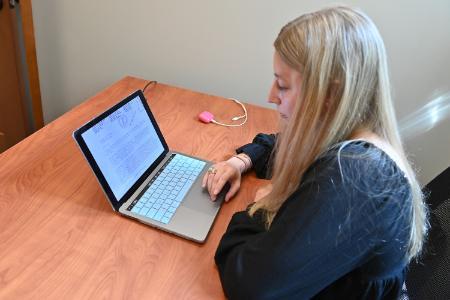Cadet Seeks Causes to Latin American Cultural Struggles

Anna Grace Adams ’26 reads a letter she found at the National Archives and Records Administration addressed to the U.S. Secretary of State, dated December 1920. –VMI Photo by Kelly Nye.
LEXINGTON, Va. Aug. 5, 2025 — In her classic book, “To Kill a Mockingbird,” Harper Lee wrote, “You never really understand a person until you consider things from his point of view.”
Anna Grace Adams ’26, a history major minoring in Arabic at Virginia Military Institute, believes considering the points of view of peoples from different cultures is crucial when establishing policy or providing aid. Adams is interested in combating the effects of drug and human trafficking originating out of the Latin American countries of Columbia, Peru and Venezuela. To better understand the peoples of those countries and their cultures, Adams spent five weeks researching government documents and presidential correspondence between the United States and those countries for her Summer Undergraduate Research Institute (SURI) project, “How did the American Perception of its Relationship with Latin American Nations Change Between 1919 and 1939?”
During the 1930s, President Franklin D. Roosevelt saw a need to improve relations with Latin American countries, so he initiated the Good Neighbor Policy, which emphasized cooperation, non-intervention, and mutual trade. Adams questioned the success of the program, and wondered if it actually caused more harm than good, laying the foundation for the many problems currently plaguing the countries it was targeted to benefit. She shared that the topic is applicable to what she may be doing in the future. “I hope to work for Child Protective Services or Homeland Security. I feel a calling to it. With any problem, you first need to understand the background. I want to better understand why the governments of these Latin American countries operate the way they do. I also want to understand the citizens’ points of view at the grassroots level, and the environments in which they grew up. I will never be able to relate to them based on my personal experience. That is why I chose to research this topic.”
Since most of the files she needed for her research have not yet been digitized and as of yet are unavailable on the internet, Adams traveled to College Park, Maryland, and spent two weeks at the National Archives and Records Administration (NARA) searching for manuscripts, articles, and correspondence necessary for her research. “There are millions of documents there. It was kind of a big scavenger hunt. Classified documents were unavailable to me. Of the declassified I was able to view, I was given strict instructions on how to photograph or scan them. I scanned one document at a time using a scanner connected to my laptop. That was basically what I did for two weeks. A lot of what I found—especially documents written during the Depression—the paper was so thin I could see through it and the ink had faded so scanning was difficult. It was quite the process.”
Adams was surprised to discover many of the documents she had hoped would be available to her don’t exist at NARA. “They either were sent back to their country of origin, or had stayed in their countries’ respective national libraries. They haven’t been digitized either. These are papers that were cited in some of my secondary sources which I spent spring semester reading. I was not planning on studying the American perspective of the Good Neighbor Policy, because there’s so much scholarship already on that. I really wanted to look at the Colombian and Peruvian perspectives, because not much research has been done on that. Now I know why. You can’t base an argument if you don’t have the evidence.” Adams admitted that frustrated her, but conceded coming up against roadblocks is often part of the research process. “I’m just very grateful that I got to experience NARA as an undergrad. I was literally the youngest person in there by decades. Even the archivists told me the typical student conducting research there is in their last year of grad school or conducting work on their PhD.”
Adam’s faculty mentor, Col. Houston Johnson V, head of the Department of History, agreed the SURI grant provided Adams with a unique opportunity to travel to College Park to access archival materials held by NARA. “Her research into U.S.-Colombian relations has been tremendously enriched by her ability to look at original State Department records. It is extremely unusual for undergraduates to be able to conduct this type of research; I’m delighted Anna Grace has had the opportunity to have that experience, and to locate valuable sources that will ground her honors thesis.”
Adams plans to present her paper at the VMI Undergraduate Research Symposium during spring semester, and use it to lay the foundation for her Institute and departmental honors thesis.
Adams is president of the Pi Alpha Theta history honor society; cadet assistant for the John A. Adams ’71 Center for Military History and Strategic Analysis; is a member of the triathlon club; serves as the Army ROTC Blue Ridge Battalion executive officer; serves as S7 captain for cadet life, responsible for general well-being and morale of the Corps of Cadets; and will commission into the Army following graduation. She is a graduate of St. Augustine School in Ridgeland, Mississippi, and the daughter of Erica and Gregory Adams of Brandon, Mississippi.
Marianne Hause
Communications & Marketing
VIRGINIA MILITARY INSTITUTE
.svg)
.png)